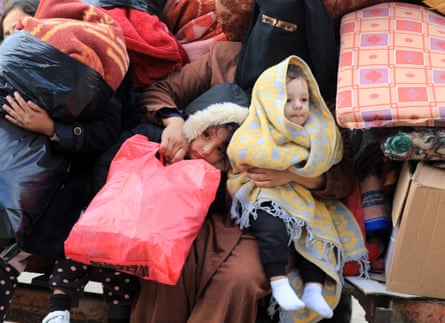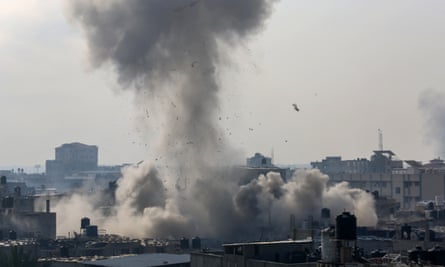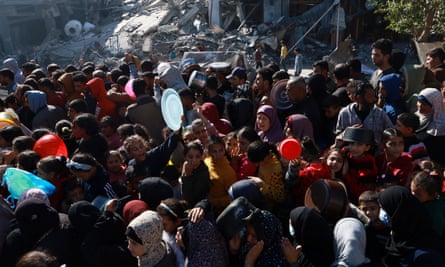‘There is nowhere to go’: Israeli bombing resumes in besieged Gaza
Fresh attacks target a population weakened by weeks without food, clean water or sanitation
It took only seconds for the bombs to start falling on Gaza again. The week-long ceasefire ended at 7am local time, and almost immediately, the sound of explosions filled the corridors of al-Nasr hospital in the south of the territory.
“This is the biggest still functioning hospital in Gaza. It’s at 200%-plus capacity,” said James Elder, a spokesperson for Unicef, describing the end of the truce from al-Nasr. “The health system is overwhelmed. It cannot take more children with the wounds of war.”
By evening, over 100 people had been killed and the already crowded wards of Gaza’s remaining hospitals were struggling with a new influx of patients, doctors and aid workers said in messages and calls from Gaza.
In the south, the fear and grief had a sharper edge, as Israel warned civilians to leave some areas it had originally declared safe zones and increased bombing campaigns in the area.
“I woke up to intense and heavy bombardment of different areas across the Gaza Strip,” Maha Hussaini, a journalist and humanitarian with the group EuroMed Rights, who is displaced from her Gaza City home, said in a phone interview. “This time the attacks seem to be closer to our areas of refuge, those same areas we were told to take refuge in.”
Local people shared pictures of leaflets, instructing residents in four Khan Younis neighbourhoods along the border with Israeli territory, to flee further south.
They knew what was coming after seven weeks of intense bombardment and a ground invasion in the north that killed more than 15,000 people, over two-thirds of them women and children.
So they took to the roads, fleeing however they could. Some were on foot or bicycles; a family of four were crammed on to a motorbike; others loaded possessions and children on to carts drawn by donkeys. Many were facing their second displacement in as many months.

“There are 6,500 families here in this shelter and we are not from round here. We have all come from the north already and have no homes. No one has anywhere to go,” said an administrator in a UN-run shelter in Khan Younis, who asked for anonymity as he was not authorised to talk to the media.
“There is no place for people even in the streets. The hospitals are totally overrun. There is nothing in the market to buy to eat and now it is cold at night too and the children are suffering badly. People are cutting down electricity poles to get wood for fires to keep warm. So where do we go in these conditions?”
Israel has said it will keep fighting until it has destroyed Hamas after the attacks on 7 October, in which 1,200 people were killed, most of them civilians.
The US secretary of state, Antony Blinken, has said Israel must do more to protect civilians as it starts targeting Gaza again. But many on the ground, or working to support civilians there, fear that an even greater catastrophe is looming.
The fresh waves of attacks hit a population physically weakened by weeks without access to adequate food, clean water or sanitation, traumatised by the damage of the war, and largely displaced from their homes. Nearly 80% of Gaza’s population are now internal refugees.
Even increased food and medical shipments during the ceasefire were a “trickle” that did not meet basic needs of people in Gaza, aid groups said.
“We are abandoned,” said a second UN administrator. The week-long ceasefire had made little difference to conditions for the displaced, who are living off flour and tinned tuna or beans distributed by the UN.

“We can hear the bombing now and a lot of people are very worried. They are just thinking about survival from day to day. Everybody has lost their homes or many relatives or both. We cannot think of anything any more.”
Gaza was densely populated before the current war began, and most of its population is crammed into the southern half of the strip, struggling to survive weeks of siege and a tight blockade.
Trying to corral civilians into ever smaller areas could have devastating consequences. “There is fundamentally nowhere for people to go,” said Danila Aizi, the Palestine country manager for the charity Humanity and Inclusion.
For now, life has returned to the grim daily rhythm of queueing for everything from food, water and toilets to a chance to power mobile phones, and waiting for attacks.

Targets on Friday included a large building in Khan Younis, and nearby a single apartment in Hamad City, a Qatari-funded housing development, the AP reported. There were also strikes on a home near Gaza city and in the refugee camp of Maghazi in central Gaza, AP reported.
Amal Abu Dagga was taken to al-Nasr hospital after her home was hit, where she sat covered in blood, weeping for her family. “I don’t even know what happened to my children,” she said.
After a week’s break from treating new war injuries, doctors in Gaza are racing to tend to another wave of patients on their already crowded wards, with supply cupboards almost empty.
“The city of Rafah today is a disaster-stricken city,” said Dr Marwan Al-Hames, the head of Mohammed Yousef El-Najar hospital in Rafah. “The medical aid that entered Gaza during the truce is only enough for one day.”
In a statement shared by the Palestinian health ministry in Gaza, he appealed for the full opening of the Rafah border crossing with Egypt, adding that the health service across Gaza remained unable to function properly, and that his hospital was searching for beds and mattresses for incoming patients, who are currently forced to lie on the floor."
No comments:
Post a Comment